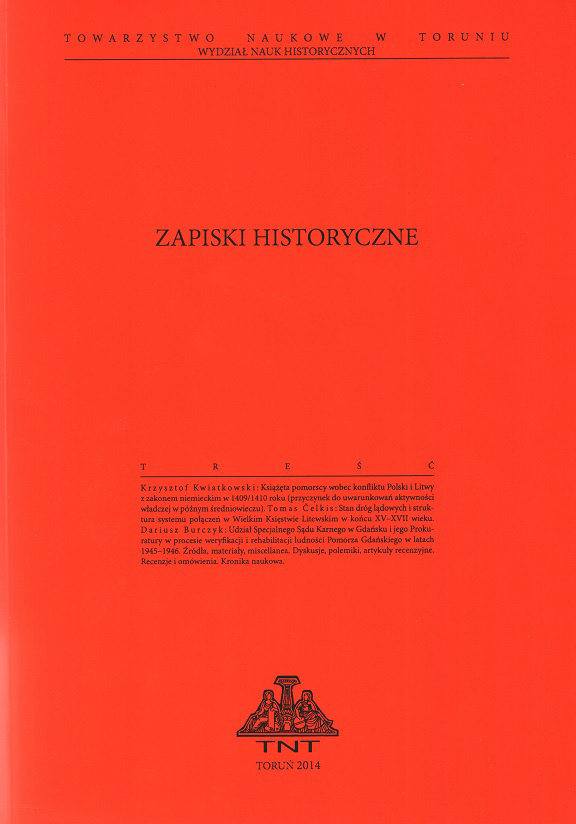Z dziejów kształtowania się mentalności elity społeczeństwa toruńskiego w XVII i w pierwszej połowie XVIII wieku
From the History of Shaping the Mentality of Torun’s Elite in the 17th Century and the First Half of the 18th Century
The Attempt to Address the Issue
Author(s): Kazimierz MaliszewskiSubject(s): Cultural history, History of Church(es), History of ideas, Social history, 17th Century, 18th Century, History of Religion
Published by: Towarzystwo Naukowe w Toruniu
Keywords: culture;Toruń;patriciate;so called “Scholars”;Protestants;religious community;Catholics;Jan Kazimierz Rubinkowski;Sarmatian culture;
Summary/Abstract: The article constitutes the attempt to formulate remarks and hypotheses referring to the mentality of the elite of Toruń’s burghers in the 17th and the first half of the 18th century, mainly on the basis of the research concerning the history of the culture of Toruń in this period. Toruń’s elite consisted of the few rich members of the proud patriciate and the group of the so called “Scholars” (Gelehrte) – people of various backgrounds, who, having acquired the university education, made a political career in the town and representatives of professions requiring a much better education” priests, teachers, doctors, pharmacists, lawyers and officials of the city authorities. The factors which united all those people in one group was the Protestant religious community (Lutherans), family, social and economic connections. The mentality of Toruń’s inhabitants was affected greatly by the life in a big city where goods were exchanged and people travelled from the north to the south and the east, and from the west to the north and east. Toruń was traditionally connected with Gdańsk and the Baltic Sea, Germany, the Netherlands, England and the Scandinavian countries. The mentality of the patriciate and burghers was imbued with religiousness in the Lutheran or Calvinist sense. The Protestant model of personal life filled with science and work prevailed. At the same time the mentality of Toruń’s burghers, in the first place those who spoke Polish and had direct contacts with noblemen and Catholics, was affected by the Baroque-Sarmatian models promoting the joy of life, the pursuit of luxury and presenting oneself from the best side. A case in point is Jakub Kazimierz Rubinkowski (1668-1749) – a nobleman and burgher of Toruń. This postmaster and burgrave of Toruń combined the features typical of the mentality of the noblemen and burghers. Toruń’s patriciate adopted many customs from noblemen and magnates, which was reflected in fashion, ceremonies, funerals, weddings, etc. Like noblemen, patricians purchased land, set up small “folwarks” and erected summer mansions in the countryside. Inhabitants of Toruń were mentally connected with inhabitants of Gdańsk. Yet, the mentality of Gdańsk’s inhabitants was mainly affected by the fact of living in a harbor open to the sea. Toruń was more closely connected with the Polish-Sarmatian background. What should be underlined is the ability to adapt and co-exist of various groups along with the ability to create a coherent whole. Toruń’s burghers were capable of reconciliating the material (the sphere of business and economy) with the spiritual (the sphere of belief and existential fear).
Journal: Zapiski Historyczne
- Issue Year: 82/2017
- Issue No: 2
- Page Range: 121-140
- Page Count: 20
- Language: Polish

